 Petzlover
Petzlover Hungarian Wirehaired Vizsla is originated from Hungary but Norrbottenspets is originated from Sweden. Hungarian Wirehaired Vizsla may grow 18 cm / 8 inches higher than Norrbottenspets. Hungarian Wirehaired Vizsla may weigh 35 kg / 78 pounds more than Norrbottenspets. Both Hungarian Wirehaired Vizsla and Norrbottenspets has same life span. Hungarian Wirehaired Vizsla may have more litter size than Norrbottenspets. Both Hungarian Wirehaired Vizsla and Norrbottenspets requires Low Maintenance.
Hungarian Wirehaired Vizsla is originated from Hungary but Norrbottenspets is originated from Sweden. Hungarian Wirehaired Vizsla may grow 18 cm / 8 inches higher than Norrbottenspets. Hungarian Wirehaired Vizsla may weigh 35 kg / 78 pounds more than Norrbottenspets. Both Hungarian Wirehaired Vizsla and Norrbottenspets has same life span. Hungarian Wirehaired Vizsla may have more litter size than Norrbottenspets. Both Hungarian Wirehaired Vizsla and Norrbottenspets requires Low Maintenance.
 In the 1930’s some breeders noticed that the Hungarian Vizsla produced some dogs with more water, cold weather and ground cover protection because they had a much thicker coat than most of the breed. One breeder decided to cross one of these females with a German Wirehaired Pointer, thus producing the first Hungarian Wirehaired Vizsla. There were now three types of Vizsla – the smooth coated, the longhaired, and the wirehaired. The longhaired is very rare and can be either smooth or wirehaired. It is also believed based on anecdotal evidence that the original Wirehaired Vizsla was also mixed with the Bloodhound, Pudelpointer, and Irish Setter during World War II. Many kennels started breeding the Wirehaired Vizsla at this time.
In the 1930’s some breeders noticed that the Hungarian Vizsla produced some dogs with more water, cold weather and ground cover protection because they had a much thicker coat than most of the breed. One breeder decided to cross one of these females with a German Wirehaired Pointer, thus producing the first Hungarian Wirehaired Vizsla. There were now three types of Vizsla – the smooth coated, the longhaired, and the wirehaired. The longhaired is very rare and can be either smooth or wirehaired. It is also believed based on anecdotal evidence that the original Wirehaired Vizsla was also mixed with the Bloodhound, Pudelpointer, and Irish Setter during World War II. Many kennels started breeding the Wirehaired Vizsla at this time.
This rare longhaired is not recognized by any official club or organization while the smooth and the wired are recognized as two separate breeds. There are only a few longhaired Vizsla and they are only found in Europe. The Wirehaired Vizsla was recognized in 1986 by the FCI in Europe and in 2014 by the AKC (American Kennel Club).
Like their cousins the smooth Hungarian Vizsla, the wirehaired version is a natural hunter and easily trained. They are great retrievers as well as pointers in the water or on the land. Their wirehair coats offer them more protection than their smooth coated cousins. They love to swim and are very good at it and will even use your back yard pool if it is available to them.
The wirehaired Vizsla came to North America in the 1970’s and was recognized by the CKC (Canadian Kennel Club) in 1977, The North American Versatile Hunting Dog Association (NAVHDA) by 1986 and in 2006 by the United Kennel Club (UKC). The Australian Nation Kennel Council offered recognition in 2007 prior to their entrance into the AKC Foundation Stock Service. They began showing the breed at AKC events in Performance and Companionship, prior to their full AKC recognition in 2014.
These gentle hunting dogs became great family dogs as they love children and just want to be with their people. Falconers have recently taken up the breed because their temperament is suited to this work as well. There are only about 400 to 450 Wirehaired Vizslas left in the United States and few thousand across the globe.
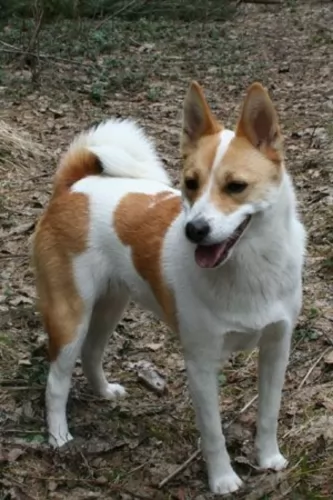 The Norrbottenspets is an ancient dog breed whose purpose has been to hunt, although these days he is a companion dog.
The Norrbottenspets is an ancient dog breed whose purpose has been to hunt, although these days he is a companion dog.
Hailing from Noorbotten, Sweden, it was after the second world war that the breed almost became extinct. This was because hunting dogs were no longer needed.
Luckily a breeding program was started, and in 1967 the Swedish Kennel Club registered the dog and a new standard was written. His friendly, amicable nature makes him a sought after companion today.
 Very much like his cousins, the Wirehaired Vizsla is a noble looking breed. He is lean and muscular with a noble head and moderate skull line. Their muzzle is just a little shorter than the skull and the end is squared. They have powerful jaws and a broad, wide nostrils. The nose is brown, and the eyes are slightly darker than the dog’s coat color.
Very much like his cousins, the Wirehaired Vizsla is a noble looking breed. He is lean and muscular with a noble head and moderate skull line. Their muzzle is just a little shorter than the skull and the end is squared. They have powerful jaws and a broad, wide nostrils. The nose is brown, and the eyes are slightly darker than the dog’s coat color.
Low set ears are long and hang near the cheeks. With a strong, long neck and muscular shoulders, the Wirehaired Vizsla certainly looks the part of a hunting dog. Her chest is a little deep and the breastbone is prominent. She has round paws with short nails. Of course, her coat is wiry and dense. The undercoat is water repellent. He has an intelligent and lively facial expression.
Their ears are long but proportionate to the head and body. Their upper teeth overlap the lower teeth. Finally, the tail is thick and usually 1/3 docked. The tail is mostly carried in a horizontal position while walking or running.
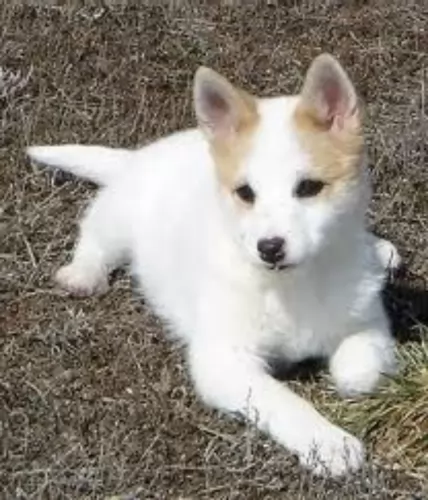 The Norrbottenspets is a small to medium sized spitz- type dog but he is muscular and compact. He stands at between 42 – 46cm in height and weighs in at between 8 and 15kg.
The Norrbottenspets is a small to medium sized spitz- type dog but he is muscular and compact. He stands at between 42 – 46cm in height and weighs in at between 8 and 15kg.
With good care he can live to be up to 15 years of age. The coat of the dog is straight and dense and you find quite a few colors such as white, yellow and reddish and sometimes there is a bit of ticking. He has a short to medium length waterproof coat which is dense.The outer coat is coarse with straight hair and the undercoat is soft and thick and the dog is a moderate shedder.
The head is wedge-shaped with erect ears, black nose and brown almond-shaped eyes. The muzzle is pointed and slim and the dog's tail is long and curls up over his back
Confident, alert and active, the Norbottenspets is an active, happy-go-lucky kind of dog, always looking for a game. It is why he gets on well with children in the home – he can sense that there is perhaps a better chance of a game with them.
He isn’t a prey-driven dog and gets on well with other pets in the home. He makes an excellent family pet and his very presence brings joy into a room as he is always cheerful.
He is stubborn and independent and will therefore require training and socialization to become obedient to your basic commands such as sit, lie-down and come.
 Very good with children as long as he gets enough exercise.
Very good with children as long as he gets enough exercise.
Very athletic
A puppy could live in an apartment in the city, but the adult dog needs a yard and is better off on a farm.
Very smart, very responsive, high learning ability.
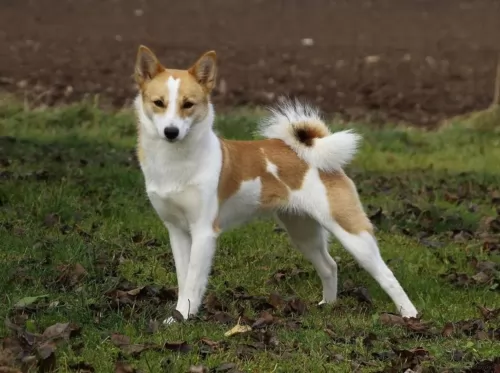 The Norrbottenspets is such an amicable, easy going pet and he is going to make you a loyal and loving canine companion. He bonds closely with his human family and will be bored and frustrated if left alone day after day in the back yard.
The Norrbottenspets is such an amicable, easy going pet and he is going to make you a loyal and loving canine companion. He bonds closely with his human family and will be bored and frustrated if left alone day after day in the back yard.
He is social and friendly and wants to be involved with the activities of his family. Feed him well, give him plenty of exercise and give him the love and care he deserves and he will make you an awesome canine companion.
 Mostly healthy but the Hungarian Wirehaired Vizsla does have some inherited dispositions to:
Mostly healthy but the Hungarian Wirehaired Vizsla does have some inherited dispositions to:
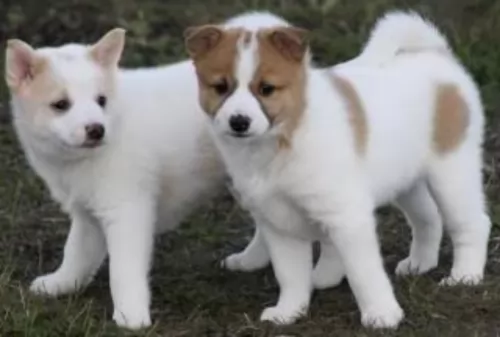 The Norrbottenspets life expectancy is between 12 and 15 years. These dogs are fairly healthy but there are always health concerns with any dog breed.
The Norrbottenspets life expectancy is between 12 and 15 years. These dogs are fairly healthy but there are always health concerns with any dog breed.
There are small numbers of the breed which are prone to a genetic condition affecting the brain and the result is poor coordination. It is sad to see because there is no known treatment and some dogs reach the stage where they can’t eat and they can’t control their toilet habits.
Dogs with hip dysplasia have an abnormal formation of the hip socket which can lead to arthritis, pain and the inability to get around. It is a genetic trait and you will need to get your pet to the vet for treatment and pain management.
 Feed high quality food for medium to large breed puppies. Feed 3-4 time a day 1-2 cups.
Feed high quality food for medium to large breed puppies. Feed 3-4 time a day 1-2 cups.
Feed high quality food for adult medium to large dogs. Feed 2x a day 2-3 cups.
Great stamina and very athletic breed.
The Wirehaired Vizsla is a working dog and needs serious daily exercise. He will be full of energy and excitement if he doesn’t get enough mental and physical stimulation. He needs a family that can walk a mole or two every day or jog with him. He easily becomes neurotic and high-strung if his energy is not dissipated. Excels at Field Trials, Competitive Obedience, tracking and Barn Hunt.
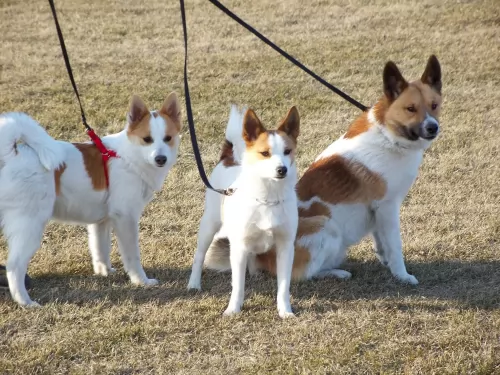 Your Norrbottenspet will be requiring a high-quality dog food if you want him to stand the best chances of being healthy. Home made food is always a good choice, but there are also some good commercially manufactured dog foods which are convenient.
Your Norrbottenspet will be requiring a high-quality dog food if you want him to stand the best chances of being healthy. Home made food is always a good choice, but there are also some good commercially manufactured dog foods which are convenient.
You want the food to have the necessary vitamins and minerals to ensure good health. Every dog will love a little bit of raw meat added to his kibble from time to time. Dogs love their meals to be consistent – no exotic, spiced foods to upset the stomach.
Boiled chicken, brown rice or pasta and cooked vegetables such as sweet potatoes, carrots and spinach can be chopped up and added to his kibble occasionally and this makes a splendid tasty treat for your pet.
You want to avoid your dog becoming overweight as this brings on a host of problems. Make sure he always has access to cool, fresh water.
The Norrbottenspets short to medium length coat will need brushing twice a week. They are clean looking dogs and you’ll find that they don’t have an unpleasant dog-smell around them.
Always check his eyes and ears for infections. Also check his teeth. A bad tooth may not be evident but it can negatively impact the immune system and cause illness with your dog.
The nails should also be cut to avoid them hooking on things.